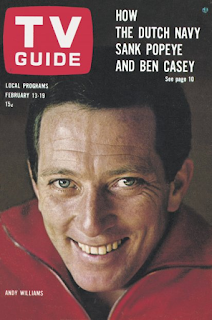This week in TV Guide: February 13, 1965
 This week's cover profile of Andy Williams was written by John Gregory Dunne; I don't have anything against Dunne, although I do prefer the work of his brother,
Dominick Dunne
, to either John Gregory or his wife,
Joan Didion
, but it bears saying that Dunne's story on Williams displays, I think, the worst aspects of TV Guide writing of the era.
This week's cover profile of Andy Williams was written by John Gregory Dunne; I don't have anything against Dunne, although I do prefer the work of his brother,
Dominick Dunne
, to either John Gregory or his wife,
Joan Didion
, but it bears saying that Dunne's story on Williams displays, I think, the worst aspects of TV Guide writing of the era. There is, for starters, the annoying habit of the author injecting himself into the article. Dunne notes in the first page that "I had no particular desire to meet the boy next door, and the first two paragraphs concern Dunne's reactions to the comments of Williams' publicist, his thoughts on the decor of the dressing room, his impressions of the books on the shelf.
Once the focus of the story turns to the putative subject, Williams, there are more TV Guide trademarks; the anonymous criticisms, for instance. "One executive who has had dealings with [Williams] refers to him in extremely unflattering terms. Another says, 'He's not a very nice young man.'" We are, of course, never told who the unnamed critics are, nor are the criticisms put in any context. Is Williams an unpleasant person? A hard negotiator? A driven, hands-on micromanager of his own show? Your guess is as good as mine.
I'm not a fan of this kind of faceless, nameless attack, but one reads it week after week in the TV Guides of the 60s. A story about insecure Gene Barry, a score-evening profile of David Susskind, a hatchet job on Patty Duke—it's almost as if the magazine. desperate to distinguish itself from the fan magazines of the era, bends over backwards to tear down every star it profiles. Now, these comments could be from someone with a score to settle: a jealous co-worker, a disgruntled former employee, a frustrated publicist. They might be completely true, or a bushel of lies, or something in-between. We could be seeing one side of the story with two sides, or we could learn what everyone in Hollywood already knows.
The point is, I don't much like writers who repeat anonymous comments without providing context. I don't think it's good journalism. I'm not suggesting all TV Guide profiles should be puff pieces; that's just as bad, and it's terrible to read. But a journalist should demand more of his sources—he should challenge them just as much as he does his subject. If what they have to say is reliable, if he's satisfied himself that their comments have merit, if he can give a positive answer to the question "Do my readers need to know this?" then by all means go ahead. But if that's the case, then give your readers that same satisfaction. Otherwise, I'm going to think your source is just nursing a grudge—and you're just a lazy writer.
Published on February 09, 2019 05:00
No comments have been added yet.
It's About TV!
Insightful commentary on how classic TV shows mirrored and influenced American society, tracing the impact of iconic series on national identity, cultural change, and the challenges we face today.
- Mitchell Hadley's profile
- 5 followers



